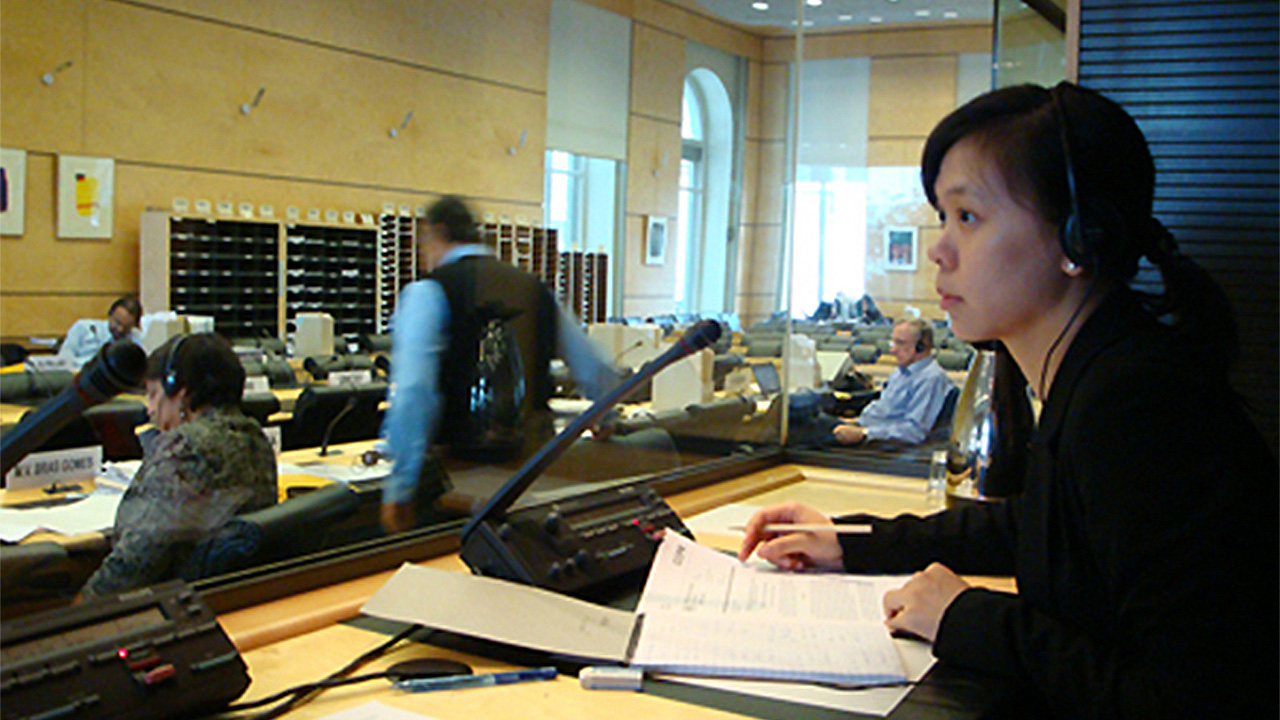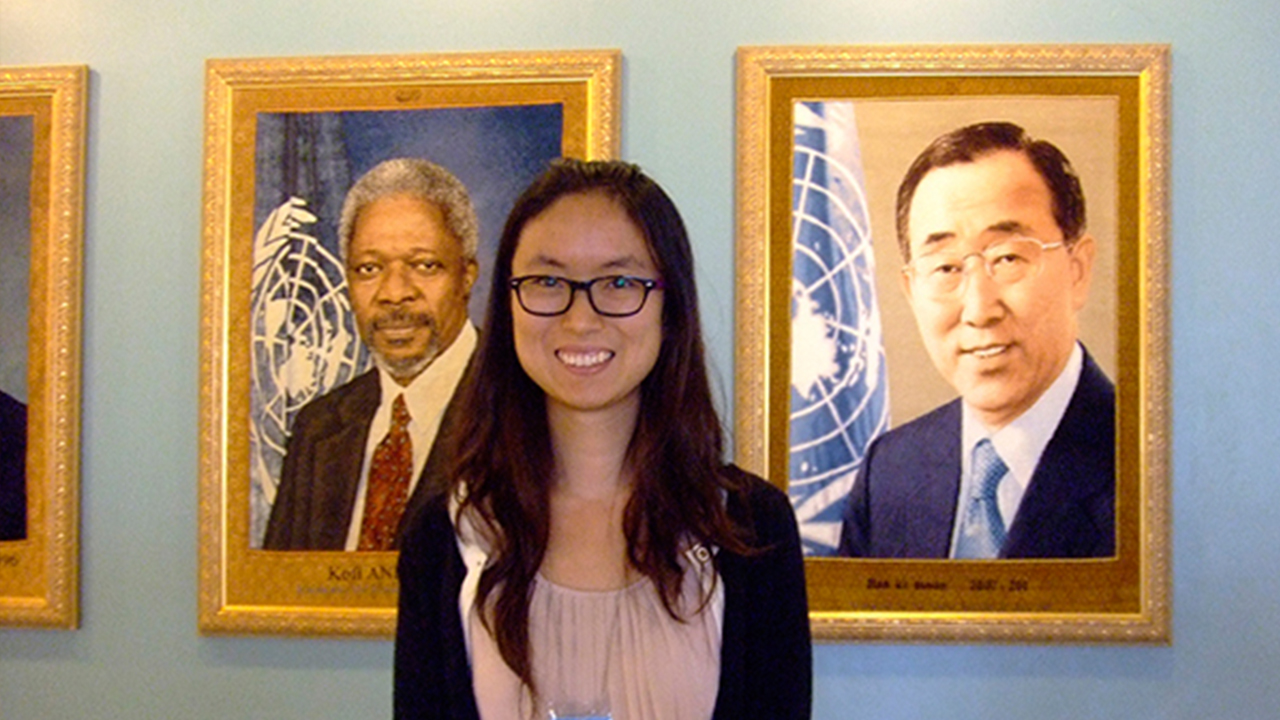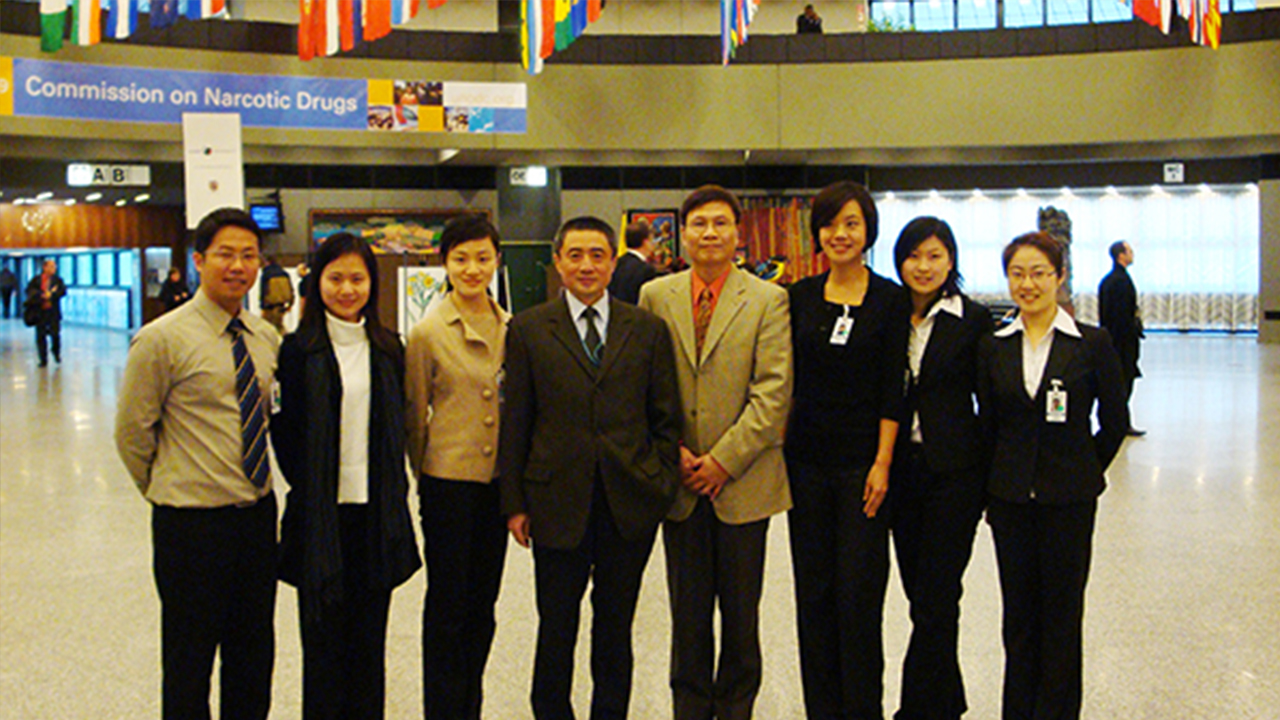| A |
t a United Nations (UN) meeting about illegal drugs and narcotics in Vienna, a government leader was delivering a speech in his native language. Meanwhile, a dozen interpreters were working in booths.
Without break, the interpreters had to interpret simultaneously and accurately during the entire session. Yang Anqi, a student from Graduate Institute of Interpretation and Translation (GIIT) in Shanghai International Studies University (SISU), was one of the simultaneous interpreters.
“The job is challenging and exhausting, but working for this conference is an honor,” Yang said.
The road to international arena
Yang is one of the students on a cooperative program between SISU and the UN, which provides opportunities for SISU students to have field practice in the UN meetings to prepare candidates for the UN Language Competitive Examination. Yang said, this program enabled her to have a rare glimpse of top-notch interpreters and a better understanding of how they work on the spot, and she knew she had a lot to improve to catch up with them.
With the aim to train professional interpreters and translators, GIIT was established in 2003, inaugurated by Omar Abor-Zahr, then Acting Director of Conference Services Division of the UN Office at Geneva. SISU is among the 21 colleges and universities worldwide that have signed a Memorandum of Understanding (MoU) with the UN headquarters and branch offices, and also signed framework agreement with the European Parliament and the European Commission.
Since 2005, SISU has been providing many international organizations with high-end interns every year, some of whom passed related examinations and finally became official interpreters and translators for UN.
Zhu Ruohan, a student in GIIT, was admitted as a translation intern by the Department for General Assembly and Conference Management (DGACM) last year. She believed that her two-month internship at UN headquarters was an “eye-opening and rewarding” experience.
“We have three veteran mentors who will polish our translations thoroughly. It really opens my mind talking with them, who boast not only outstanding professional abilities but also rich life experiences,” Zhu added. “Translating those documents on official meetings in a real working environment improves my translation skills a lot. Besides, I have a deeper understanding of how the UN runs every day.”
In her internship, Zhu worked with two other interns on many issues, including world peace and security, colony, women rights, human right, and judiciary. Zhu noticed that translating UN documents needs a “neutral and balanced” standpoint.
“In the process of translating, you have to figure out the speakers’ undertones and perspectives, and pay special attention to wording and consistency of technical terms,” Zhu said.
Zhu said she was not overstressed by the high-demanding translation work covering a wide range of topics, thanks to the professional training offered by GIIT. “I’ve learned professional translation theories and how to use translation softwares”, she said. “Prof. Yao Jinqing once led us in an international organization documents translation program. All these factors prepare me well for facing the challenges in the internship head-on.”
Zhu’s confidence in translation serves as a testimony to GIIT’s emphasis on intensive practice. To create real working environment for the students, GIIT has set up an intern center which takes translation work from international organizations and assigns them to students for field practice. Meanwhile, GIIT also established cooperation with international organizations as well as domestic enterprises and public institutions to build a systematic internship system.
The UN now offers intern posts for translators, interpreters, editors and verbatim reporters. By its cooperation agreement with the UN, GIIT will send more students to Rome to participate in the intern translator program at the UN Food and Agriculture Organization (FAO). Until now, more than 10 students from GIIT, SISU, have served as interns at the FAO, the UN headquarters in New York and the Geneva Office since 2009.
Following the path of leading professional translators and interpreters
Since 2003, GIIT has been sending students abroad for internship before graduation. This early March, two groups of students went to UN Vienna branch office and European Parliament in Brussels, Belgium, respectively.
Before departure, these students had elaborate preparations: they read tons of documents, made their own glossary of professional terms, and watched numerous videos of UN meetings to get themselves acquainted with the usual process followed by and fixed expressions used in UN meetings.
Besides, Prof. Dai Huiping, Vice-dean of GIIT and member of International Association of Conference Interpreters (AIIC), opened special courses to introduce the structure and operation mode of the UN and the European Union.
To pursue the dream of becoming great interpreters, Conference Interpreting majors in their second year will start to go abroad every year for internship in Vienna, Brussels, Nairobi, Geneva and etc. More than 70 students have participated in the internship program since 2005.
To be aspiring and responsible citizens of the world
Li Shuo, a GIIT student, said what impressed him most in his internship at UN headquarters during his summer holidays is not the improvement of his professional skills but the global perspective on understanding international issues and cultural differences.
“Near the end of our internship, Ban Ki-moon, Secretary-General of the United Nations, had a group photo taken with all the interns,” Li said. “I was impressed by one of his remarks-- He said to be aspiring and responsible citizens of the world, the young generation need to keep their feet rooted to the ground while looking up at the starring sky overhead.”
In Li’s view, translation in the UN means more than dealing with written words. In translating documents on such global and regional issues as territorial disputes, sexual discrimination, narcotics and child abuse, she has a direct and new understanding of these issues, especially the importance of cultural diversity and identity.
As one of 21 Universities that have signed MoU with the UN for cooperation in preparing candidates for the UN Language Competitive Examinations, SISU has held the Third United Nations-MoU Universities Conference this April. It was the first time for a Chinese-speaking country to host it.
According to the MoU between SISU, the UN and the European Commission, the professional diploma in conference interpreting awarded by SISU is recognized by the UN and the EU, the holder of which is qualified for simultaneous interpretation and consecutive interpretation in various settings such as international organizations, diplomacy and foreign affairs, and international conferences.
This year marks the tenth anniversary of GIIT. The past ten years have witnessed great efforts and achievements on the part of GIIT by cooperating with international organizations like the UN. Now, with the university’s drive to internationalize, GIIT pledges to be more involved in the language services of the UN under the framework of the conference, and says it will further commit itself in promoting closer cooperation with the UN particularly in faculty building, student internships and graduation examinations.







